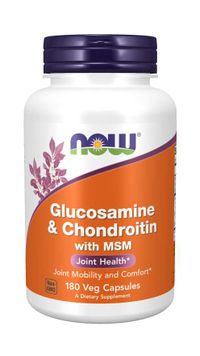Glucosamine
From Wikiwel
Other names: glucosamine sulfate, glucosamine sulphate, glucosamine hydrochloride, N-acetyl glucosamine, chitosamine
Glucosamine is a compound found naturally in the body, made from glucose and the amino acid glutamine. Glucosamine is needed to produce glycosaminoglycan, a molecule used in the formation and repair of cartilage and other body tissues. Production of glucosamine slows with age.
See also :
Special Precautions of Glucosamine
- Most studies involving humans have found that short-term use of glucosamine is well-tolerated. Side effects may include drowsiness, headache, insomnia, and mild and temporary digestive complaints such as abdominal pain, poor appetite, nausea, heartburn, constipation, diarrhea, and vomiting. In rare human cases, the combination of glucosamine and chondroitin has been linked with temporarily elevated blood pressure and heart rate and palpitations.
- Since glucosamine supplements may be made from shellfish, people with allergies to shellfish should avoid glucosamine unless it has been confirmed that it is from a non-shellfish source. The source of glucosamine is not required to be printed on the label, so it may require a phone call to the manufacturer.
- There is some evidence suggesting that glucosamine, in doses used to treat osteoarthritis, may worsen blood sugar, insulin, and/or hemoglobin A1c (a test that measures how well blood sugar has been controlled during the previous three months) levels in people with diabetes or insulin resistance.
- Theoretically, glucosamine may increase the risk of bleeding. People with bleeding disorders, those taking anti-clotting or anti-platelet medication, such as warfarin, clopidogrel, and Ticlid, or people taking supplements that may increase the risk of bleeding, such as garlic, ginkgo, vitamin E, or red clover, should not take glucosamine unless under the supervision of a healthcare provider.
- The safety of glucosamine in pregnant or nursing women isn't known.
The Benefits of Glucosamine are
Glucosamine is often combined with Chondroitin sulfate, a molecule naturally present in cartilage. Chondroitin gives cartilage elasticity and is believed to prevent the destruction of cartilage by enzymes. Glucosamine is sometimes combined with methylsulfonylmethane, or MSM, in nutritional supplements.
- Osteoarthritis. Most research on glucosamine sulfate has measured its effectiveness on osteoarthritis of the knee. However, there is some evidence that it might also help osteoarthritis of the hip or spine.
- Temporomandibular joint (TMJ) arthritis. TMJ is the joint in the jaw that dentists often check for clicking and proper alignment. It can be a factor related to jaw pain, chewing, yawning, and talking. Some research shows that taking glucosamine sulfate works about as well as the nonsteroidal anti-inflammatory drug (NSAID) ibuprofen (Motrin, Advil, etc) for relieving jaw pain. In some people, pain relief appears to continue for up to 90 days after glucosamine sulfate is discontinued.
- Glucosamine and Chondroitin : Glucosamine sulfate is found in many supplements in combination with chondroitin sulfate, a glycosaminoglycan that also occurs naturally in the body. Chondroitin is responsible for keeping the joint cartilage lubricated by absorbing water and providing the building blocks for new cartilage to be generated. In supplement form along with glucosamine sulfate, chondroitin appears help alleviate symptoms of osteoarthritis. In a study published in the medical journal "Drugs and Aging," researchers found glucosamine-chondrotin sulfate supplements to be somewhat effective for relieving pain and delaying the progression of moderate-to-severe osteoarthritis of the knee.
- Glucosamine MSM : Glucosamine sulfate with methylsulfonylmethane, or MSM, is another type of glucosamine dietary supplement available for the treatment of osteoarthritis. Methylsulfonylmethane is a naturally-occurring sulfur compound typically found in many grains, fruits and vegetables. It is needed by the body for the synthesis of cartilage and other connective tissue. The pharmacology journal "Clinical Drug Investigation" reports one study found MSM, when used along with glucosamine, was effective for reducing inflammation and pain associated with osteoarthritis of the knee.
- Other conditions for which glucosamine is used include rheumatoid arthritis, inflammatory bowel disease (Crohn's disease and ulcerative colitis), chronic venous insufficiency, and skin conditions, although further evidence is needed.
- Glucosamine is a natural lectin blocker! (Gluten Sensitivity).
